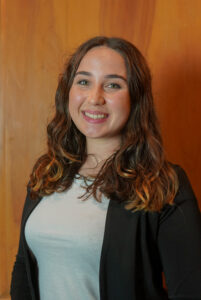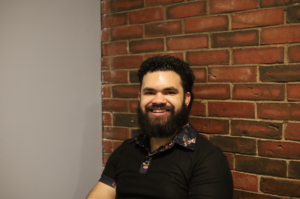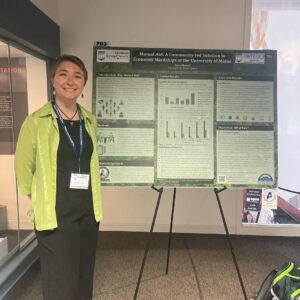Zipping up her wetsuit and sliding on her flippers, University of Maine fourth-year student Jennifer Field gets ready to plunge into the ocean on another scuba diving adventure.
“Diving is an extremely large part of my life,” Field said. “Diving isn’t only a passion and hobby of mine, but I would love to incorporate it into a full-time job, whether that be dive rescue with the Coast Guard or using it to help set up protective policies for coral reefs around the world.”
Field is certified in Scientific Diving, Dive Rescue, CPR, First Aid, as well as being qualified to be an Advanced Diver and also administer oxygen. Growing up with a father who told stories of his scuba diving adventures, Field always knew the ocean was something she would one day explore.
“Most of my passions have always involved water,” Field said. “I grew up going to Cape Cod every summer, always visiting Woods Hole and the ocean. I have always been drawn to the water, and always feel most comfortable in water, even with showers.”
Field is a Marine Sciences student from Shelburne Falls, Mass. She is interested in learning more about the ocean and the creatures that inhabit it.
“I love learning about how ocean acidification affects coral reefs, how parasites in sharks are being used for cancer research, as well as different policies around the world that are set in place to protect different marine organism, such as fishing laws in place for shark finning and more,” Field said.
For over two years, Field has worked with Dr. Rhian Waller in her histology lab studying the sexual reproduction of cold water coral. Her capstone thesis involves the coral Primnoa pacifica and the possible differences in how they reproduce according to changing depths and areas of Glacier Bay National Park.
“Over the past two years of working with Rhian I have learned so much about corals,” Field said. “This summer I was fortunate enough to work with a genetics specialist Michelle Taylor, which has really piqued my interest. I have only worked with the reproduction side of corals so I am eager to learn more about genetics.”
Field also worked with Dr. Robert Steneck on a project related to the cell walls of algae. The project involved the different widths of cell wells before and after the industrial revolution.
“When I was in fifth grade I saw a photo taken by National Geographic photographer Brian Skerry. Within this photo was a Right Whale and diver, not only was the diver so incredibly small next to this majestic creature, but it looked as though the whale is dancing with the diver. After reading an interview about the encounter, I knew I wanted to not only be a diver, but work with marine organisms,” Field said.

Field is a sister of the Fraternity Phi Mu and is also involved in many extracurricular activities on campus. She is on the water polo team, in the Marine Science Club, Scuba Club, Coral Club and is currently learning how to play the guitar.
“I am a very driven person and want to be the best in almost anything I do, so failure is never an option for me, but it does happen,” FIeld said. “Without failure we can’t learn from our mistakes.”
Field transferred to UMaine in 2015 and was diagnosed with Guillain-Barre syndrome, an immune system disorder, which caused her to postpone school on a medical diagnosis for one semester in fall of 2016.
“I was fortunate enough after learning how to walk again to attend UMaine that upcoming spring,” Field said. “It was a lot of hard work to come back to UMaine so quickly; however I was determined to graduate because I love my major so much. After being diagnosed it has set me back from graduating on time, but I am still incredibly proud of myself for sticking with it. I couldn’t have done it without the support of the marine science community, and my family and friends.”
Field continues to dive and hopes to learn new things about the ocean every time she jumps in.










